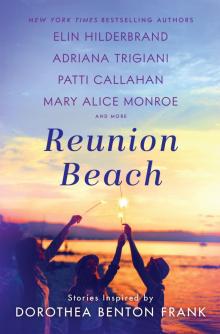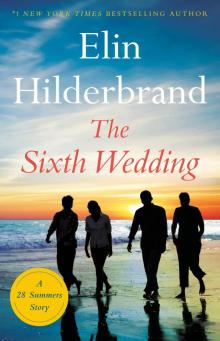- Home
- Elin Hilderbrand
The Sixth Wedding
The Sixth Wedding Read online
The Sixth Wedding
Elin Hilderbrand
Little, Brown and Company
New York Boston London
The characters and events in this book are fictitious. Any similarity to real persons, living or dead, is coincidental and not intended by the author.
Copyright © 2021 by Elin Hilderbrand
Cover design by Lauren Harms
Cover art by Michael H / Getty Images
Author photograph by Nina Subin
Cover copyright © 2021 Hachette Book Group, Inc.
Hachette Book Group supports the right to free expression and the value of copyright. The purpose of copyright is to encourage writers and artists to produce the creative works that enrich our culture.
The scanning, uploading, and distribution of this book without permission is a theft of the author’s intellectual property. If you would like permission to use material from the book (other than for review purposes), please contact [email protected]. Thank you for your support of the author’s rights.
Little, Brown and Company
Hachette Book Group
1290 Avenue of the Americas, New York, NY 10104
littlebrown.com
twitter.com/littlebrown
facebook.com/littlebrownandcompany
First ebook edition: June 2021
Little, Brown and Company is a division of Hachette Book Group, Inc. The Little, Brown name and logo are trademarks of Hachette Book Group, Inc.
The publisher is not responsible for websites (or their content) that are not owned by the publisher.
The Hachette Speakers Bureau provides a wide range of authors for speaking events. To find out more, go to hachettespeakersbureau.com or call (866) 376-6591.
ISBN 978-0-316-30917-2
E3-20210329-DA-ORI
Table of Contents
Cover
Title Page
Copyright
Introduction
Cooper
Ursula
Link
Leland
Jake
Fray
Bess
Cooper
Jake
Discover More
About the Author
Explore book giveaways, sneak peeks, deals, and more.
Tap here to learn more.
What are we talking about in 2023? Home robots, life on planet B20, the resurgence of “appointment television,” an NFL team in Paris, a phone battery that holds a charge for one year, the Hamptons submarine, Elon Musk’s “moon colony,” an eight-billion-sensor economy and…the end of the pandemic. Social distancing, quarantining, PCR and antigen tests, masks and PPE are in our collective rearview mirror. We can gather once again. Twenty thousand people pack into Madison Square Garden to hear Billy Joel segue from “My Life” into a cover of “Tenth Avenue Freeze-Out.” Super Bowl LVII is held in Glendale, Arizona, and those who don’t have tickets crowd around the bar at Kimmyz on the Greenway. Movie theaters are packed, people do the Electric Slide at weddings, and Viking River Cruises has a three-year wait list. Every treadmill at Orangetheory Fitness in Boca Raton is spoken for; all Peloton classes in both New York and L.A. are sold out. The late-night Jimmys perform their monologues in front of a live studio audience. The Broadmoor Hotel in Colorado Springs is at 95 percent occupancy and there’s no hope for getting a ticket to a Boston Pops Christmas performance unless you want to pay five thousand dollars on StubHub. Bingo night at Chai Point Senior Living in Milwaukee is back on, every Wednesday at 6:00 p.m.! We all go to have our teeth cleaned, our eyes checked. The theme of the Met Ball is Fashion Returns (people get dressed up, wear heels). The impossible-to-get item is no longer toilet paper, it’s a seat on Alitalia’s Friday night flight from JFK to Rome. The online dating scene rebounds with a fervor—people are meeting IRL!—with newcomer Firepink leading the way for Gen X and Boomers. The Dow soars over forty thousand—and we thought the 1920s were roaring!
Although we are relieved that life is “getting back to normal”—we have returned to our offices and in-person meetings; we’re throwing away our ring lights, if we never Zoom again it will be too soon—we have all learned some valuable lessons, and not just how to make sourdough bread. We have learned to save and budget for the unexpected. We have learned to cherish all the things we temporarily lost: baseball games, author tours, Disney World, family reunions, charity benefits, college visits (college, period), our sense of taste and smell, acoustic night at Frayed Edge Coffee, sitting next to a stranger on a bus or at a bar, seeing one another smile, and most especially the opportunity to hug our loved ones wherever we want, whenever we want.
We honor the ones we have lost.
What are we talking about in 2023? We are talking about our shared grief. We are talking about our collective gratitude.
Cooper
In the summer of 2023, Cooper Blessing is fifty-six years old, and when he gets down on one knee on the sidewalk in front of the Red Star Bar & Grill in Fells Point, he’s momentarily concerned that he’ll need help getting back up. But he’ll worry about that in a minute.
“Stacey,” he says, prying the ring box open. The ring is a 1.75 karat ruby flanked by 1 karat oval diamonds, set in platinum. Cooper bought the ring at Market Street Diamonds, which was where he bought rings for wives numbers one and four, but those had been diamonds-only. The ruby is something new; it’s Stacey’s birthstone. “Will you marry me?”
Stacey Patterson’s eyes widen. The people who are gathered outside the Red Star—couples dining at the café tables, people in line for the bar, an older gentleman out walking his Pomeranian—turn to stare.
Stacey takes the ring box and snaps it shut. “Let’s go to the car,” she says, and she offers Cooper a hand.
They’re parked in the lot across Wolfe Street; the walk there is like an extended free-fall. Cooper and Stacey have had a wonderful evening. The Red Star has been “their” place for the past eight months: the hostesses, bartenders, and wait staff know them by name. They had drinks and dinner and they danced to the live band, Purple Porpoise, until they were sweaty and breathless, making Cooper feel like he was twenty-two again, a senior at Johns Hopkins out on a date with his Goucher girlfriend.
He’s wise enough to keep his mouth shut until they reach Stacey’s car, a sleek silver Audi A4. Stacey appreciates fine automobiles, one of the many things Cooper loves about her.
When they climb in, Stacey cranks the air-conditioning, which is a relief. The Baltimore night is hot, sticky, foul. “I’m not going to marry you, Cooper.”
“You’re not?” he says. He closes his eyes and tries to let the cool air soothe him. How did he misread this? At the risk of sounding sappy, he thought this would be his storybook ending.
Cooper first saw Stacey Patterson thirty-seven years earlier at a party in the basement of the Phi Gamma Delta house. It was early September, the first week of school. Cooper had the robust confidence of a sophomore and he was finally in a position to chat up the freshman women from Goucher (they had all ignored him the year before). He picked Stacey like he was cutting the prettiest bloom off a rosebush. Stacey had long, dark hair and she was wearing a yellow sundress. The other women in her cluster were in jean shorts, one in short overalls, reminding Cooper of his younger sister, Mallory, who intentionally “dressed to distress.” Cooper’s parents, Senior and Kitty, were formal people who believed in good grooming and first impressions. As enthusiastically as Mallory rejected these values, Cooper embraced them. He admired not only Stacey’s dress but her pearl earrings, her sandals, her French manicure. She was put together. Cooper walked right up to Stacey and offered his hand and a smile, thinking how delighted Kitty would be when Cooper brought this young woman home.
/> Cooper and Stacey had dated for three years, until Cooper graduated from Hopkins, moved to Washington, where he’d scored a prestigious job with the Brookings Institution, and decided that he had outgrown his college girlfriend. Stacey wasn’t quite as upset as Cooper thought she might be. Because she’d been dating Cooper since her freshman year, she hadn’t had the “full college experience,” she told him. The break-up would be good for them both, she said—what she meant, it turned out, was that she wanted to date other people, starting with the captain of the Hopkins lacrosse team.
Okay, fine, Cooper thought. Good for Stacey. He could meet women at any one of the trillion bars in Georgetown. The problem was that Cooper was back to being a freshman—a freshman at adult life—and the women that Cooper met at Clyde’s and the Tombs were clerking for this judge, interning for that senator, researching those initiatives at the NIH, and they intimidated him. More often than Cooper would have guessed, when he got home from the bars at night, he called Stacey.
Sometimes she answered, sometimes she didn’t.
Cooper and Stacey got back together, briefly, ten years later when Cooper was home in Baltimore for Christmas and Stacey, still single, was working as VP of marketing at the Baltimore Aquarium. That interlude fell between Cooper’s first and second marriages and although Stacey had been eager to get more serious, Cooper was hesitant (though why, he can’t recall) and he’d stopped calling.
Stacey, meanwhile, married one of the marine biologists at the aquarium and had two children—first a daughter, Amanda, and five years later, a son, Alec. Stacey and her family lived in Ellicott City, the kids went to parochial school, and husband and wife presumably commuted to work together. Cooper received a Christmas card every year, the tasteful kind with carefully curated photos—skiing in the Poconos, on the beach in Rehoboth—and he thought, Okay, fine. Good for Stacey.
This past Christmas, however, the card included only pictures of Stacey and the kids; the husband, Lars, wasn’t mentioned. A quick check of Facebook confirmed that Stacey was, once again, single.
At that point, Cooper had been divorced from Amy for nearly three years. He couldn’t call Stacey fast enough—and they had been together ever since. Nearly eight months.
They were happy, he thought. They joked all the time about how their relationship was the “best use of Facebook.” No one would ever forget your birthday again, but that didn’t hold a candle to reuniting with your old flame.
“You’ve been married five times,” Stacey says now. “And divorced five times. I love you, but you’re a bad bet, and although I have some unflattering qualities, stupidity isn’t one of them. The quickest way to put an end to this relationship is to get married.”
Coop opens the ring box. The ruby is the color of a bleeding heart.
“But I like being married,” Coop says.
“You don’t, though,” Stacey says. “You’ve failed at it. Five times, Coop. That isn’t normal.”
“Maybe the sixth time is the charm,” Cooper says. He’s trying for levity. Stacey has a great sense of humor, she’s fun, she’s smart and secure, she gets it—”it” being the world, life—in a way that none of his wives did, and Cooper wants to grow old with her. They can take Viking River Cruises, drive an RV across America, watch Jeopardy!, learn to play bridge.
Stacey starts the car. “There’s something wrong with you, Coop. And I was mistaken before. The quickest way to put an end to this relationship is to propose on the sidewalk like that.”
“That was impulsive, I’m sorry,” Coop says. “What if I start over privately, here and now. Please, Stacey, will you marry me?”
“No,” she says, as she feeds their parking stub into the greedy mouth of the machine at the exit. The barrier rises. “I’m sorry, but no.”
There’s something wrong with you, Coop. Stacey Patterson had the courage to state what no one else would. All his life, people have been telling Cooper he’s an “old soul.” He’s been here before, he was born with an…ease. An…understanding. Who was the first person to tell him this? His mother? A teacher? Geri Gladstone from across the street? Well, whoever it was did Cooper a great disservice. He’d always trusted his instincts—even after they turned out to be wrong again and again and again. (And again and again.)
Cooper’s most recent ex-wife, Amy, is a psychologist in the District, and in order to find someone who isn’t a close colleague of Amy’s, Cooper has to look in northern Virginia. Fairfax, as it turns out, where he makes an appointment with a woman named Dr. Theron Robb. Whereas Amy is known as a “touchy-feely” therapist, Dr. Robb is cool and reserved. Cooper appreciates this. He doesn’t need someone to empathize with him; he needs someone to tell him what’s broken and how to fix it.
Dr. Robb is in her late forties, Cooper would guess. She’s tall, Black, and as slender and graceful as a ballerina—but Cooper must think of his therapist as a person, not a woman.
“You lost your parents in a tragic car accident in 2013 and your sister to cancer in 2020. You’ve been divorced five times.” Dr. Robb pauses. “That’s a lot of loss.”
Cooper nods.
“It’s no wonder you proposed to Stacey,” Dr. Robb says. “I’m sure you were driven by a primal instinct for permanence. Someone who would stay.”
“Maybe?” Coop says. “I’m not completely alone. My nephew, Link, is living with me this summer, doing an internship at Brookings. We’re close.”
“But he’ll go on to have his own life,” Dr. Robb says. “He won’t be with you forever.”
“True.” Cooper doesn’t like to think about this. Link is the only family he has left and Cooper loves the kid like a son, always has.
“Why did your marriages end?” Dr. Robb asks.
“Various reasons,” Coop says. “Sometimes it was them, sometimes me. The most recent divorce was me. I wanted out.”
Dr. Robb studies Cooper frankly from behind her glasses. He would love to know what she’s thinking. “When was the last time you were happy?” she asks. “When was the last time things felt right? Can you take me back there?”
“I’m not completely obtuse,” Coop says. “I’ve given this exact question a lot of thought. The mistakes started on Nantucket Island in 1993.”
Dr. Robb laughs, startled. “I hadn’t anticipated that kind of archaeological dig, but I’m game. What happened on Nantucket in 1993?”
“I left my own bachelor weekend,” Coop says. “My sister, Mallory, was cool enough to invite me and my two best friends to visit her over Labor Day. And then she had her best friend from growing up come as well, so there were five of us around the dinner table. I can remember when we all hoisted our glasses, thinking how lucky I was. That moment was…golden.” Coop sighs. “Then, later that night, my fiancée, Krystel, called to demand that I come home. She was jealous, she was threatened…”
“Controlling,” Dr. Robb says.
“And I left,” Cooper says. “I abandoned my sister, I abandoned my friends. But most of all, I abandoned myself.”
Dr. Robb nods.
“So I guess if I could go back to any point, I would choose that night.”
“I see.”
“A bunch of things happened that weekend after I left,” Cooper says. “Crazy stuff, like from a novel or a movie. And I set them all in motion by leaving. If I had stayed on Nantucket in 1993 instead of going home…my sister’s life, my friend Jake’s life, and my friend Fray’s life all would have been different.”
“That’s a pretty big statement,” Dr. Robb says.
“I know,” Cooper says. “But it’s true.” He drops his head into his hands. “I can’t tell you how many times I’ve wished I could go back and do it over.”
Ursula
On Sunday evenings, Ursula stops working long enough to make two phone calls—the first to her daughter, Bess, and the second to her ex-husband, Jake McCloud.
This is what passes for Ursula’s family life these days.
Bess lives in Washi
ngton, DC, at the Sedgewick in Dupont Circle, just like Ursula herself did thirty years earlier. She works for the National Council of Nonprofits, an umbrella organization that consults with and advises nonprofits across the country, and it’s her dream job; Bess has always wanted to save the world and empower the disenfranchised, and in this job she doesn’t have to choose between the homeless and hungry children—she helps everyone who’s in need. Ursula sends Bess money for rent and living expenses, and if and when Bess decides she wants to go to law school, Ursula will pay for that as well.
“How was your week, sweetie?” Ursula asks.
“Long,” Bess says. “I’m working with the Red Cross on their national campaign.”
“That sounds exciting,” Ursula says.
“The director basically offered me a job,” Bess says.
“I’m not surprised,” Ursula says. More likely than Bess going to law school will be one of the nonprofits she’s working with snapping her up as executive director. She has always been more like Jake than Ursula. “Did you do anything fun this weekend?”
“I had a date Friday night with some guy who works for the Nature Conservancy,” Bess says. “I had to spend two hours pretending to be outdoorsy while he described climbing Denali. It was painful.”
“DC is filled with men, sweetheart,” Ursula says. “Find yourself a hot young lobbyist.”
“I am not dating a lobbyist,” Bess says. “But you’re right, those guys are the hottest. Honestly, it’s like hotness and social conscience are inversely proportionate.”
“Except for your father,” Ursula says. “A do-gooder and hot.”
“Ew, Mom, please.”
“You’re still so young,” Ursula says. “You should wait at least another five years before…”
“I know, I know,” Bess says. “How was your weekend, Mama? Did the great UDG do anything fun? Depose the bagel guy, maybe?”

 What Happens in Paradise
What Happens in Paradise Reunion Beach
Reunion Beach The Sixth Wedding
The Sixth Wedding 28 Summers
28 Summers Summer of '79: A Summer of '69 Story
Summer of '79: A Summer of '69 Story Troubles in Paradise
Troubles in Paradise The Perfect Couple
The Perfect Couple Winter Solstice
Winter Solstice Barefoot: A Novel
Barefoot: A Novel